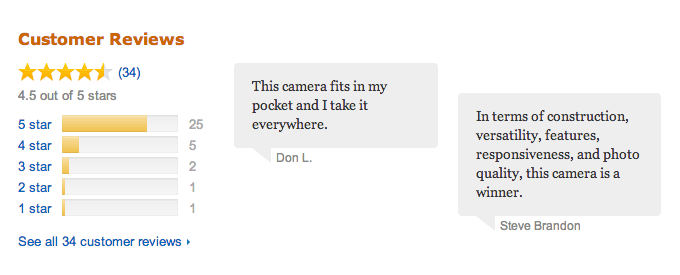Why Testimonials Matter – And How to Collect Them
Winning your first client is one of the biggest hurdles you'll face as a freelancer. From then on, it becomes easier to find clients, as long as you promote your services in the right way.
One key to marketing your services is collecting testimonials.
In freelancing terms, a testimonial is a public statement from one of your clients saying how he or she benefitted from using your services.
Let's take a look at why collecting testimonials is so important, and what you can do to collect them.
Testimonials Matter – Here's Why

Whenever I'm buying something on Amazon, I always skip the product description and go straight to the reviews. Why? Because the product description is written by the retailer. They're going to present the product in the best possible light. Reviews, on the other hand, give an honest, impartial viewpoint.
Likewise, Trip Advisor has become an essential tool when I'm planning a vacation. I want to stay in clean and comfortable accommodations, and to see the best sights. Reading reviews helps me find exactly what I want. I trust reviews to tell the truth about a product or business.
Why am I telling you this? My penchant for looking at reviews before I make a purchase isn't particularly unusual. In fact, it's the norm. Nielsen’s 2012 "Global Trust in Advertising Survey" found that 70% of consumers trust online reviews from people they don't know. Meanwhile, the Local Consumer Review Survey, also conducted in 2012, showed people trust online reviews as much as recommendations from friends and family.
Collecting testimonials for your business is similar to Amazon collecting reviews for the products it sells or Trip Advisor amassing reviews of tourist destinations. When you display testimonials on your website, potential customers will trust that they're an honest representation of your services.
As well as boosting your credibility, which helps potential clients trust you, testimonials are useful in other respects. First, the feedback you get from testimonials can help you improve the services you offer. Second, by asking your clients to write a testimonial for your business, you're reinforcing their positive experience of working with you. As they write your testimonial, they'll think about everything they appreciate about your services. Third, publishing testimonials on your site gives you one more page to be tracked by search engines, which is good for your SEO.
Editor's note: You might have seen testimonials at work on our home page!
How to Collect Testimonials
How you collect testimonials will depend on the number of clients you work with. If you're a large business with high client turnover, then you might find a survey app like WuFoo helpful… If, like me, you have a small number of loyal clients, then you're best to approach each client individually to ask for a testimonial, whether that's by email, telephone, or face-to-face.
When you reach out to ask for testimonials, you need to bear two things in mind:
Timing
The best time to ask for a testimonial is just after you've completed a project for someone, and they've told you that they're pleased with your work. Another opportune moment is when you've connected on LinkedIn, as LinkedIn has a built-in tool to ask for recommendations.Needless to say, the beginning of a client relationship or when a project has been sent back for revisions is not the time to ask.
- How you ask
Be polite, and make it clear that what you're asking is a request, not a demand. It's also important to ask the right kind of questions. That way, you'll collect testimonials that help potential customers make a decision on whether your services are right for them.
A short note saying: "I'd love to get your feedback on working with me. This is so I can make my services even better, and to help me improve my marketing. Would you be willing to answer a few questions about your experience of using my services?"
A "yes" means you can follow up with your questions. Make sure one of your questions is, "Would you mind if I use your answers as a testimonial on our website and marketing materials?".
Editor's note: If your client has a business, we've found offering a link to their web site from wherever you're displaying the testimonials works well to promote goodwill.
Good questions to ask include
- How did you benefit from working with us?
- What's changed for you after working with us?
- What were the results you hoped to see from working with us? What were the actual results?
- What surprised you about working with us?
- Would you recommend our services? If so, why?
Of course, the responses to some questions may be negative. This gives you insight for how to improve your services and provides you with an opportunity to put things right.
Before publishing the answers you get as testimonials, you should edit them down to the most pertinent extracts. Should you correct spelling and grammar? Some people say not, because typos add authenticity. Personally, I prefer to correct spelling mistakes. Once you've edited the testimonial, check with the client that they're happy for you to publish that extract as a testimonial. Then you're ready to publish.
Finally, when a client provides a testimonial, always show you appreciation. They've helped you out in a big way, so they deserve to be thanked.
Do you want to make working with clients seamless? Making it simple for your clients to pay invoices can improve customer satisfaction. Check out Cashboard to find out how it can improve your freelance business.
comments powered by Disqus


